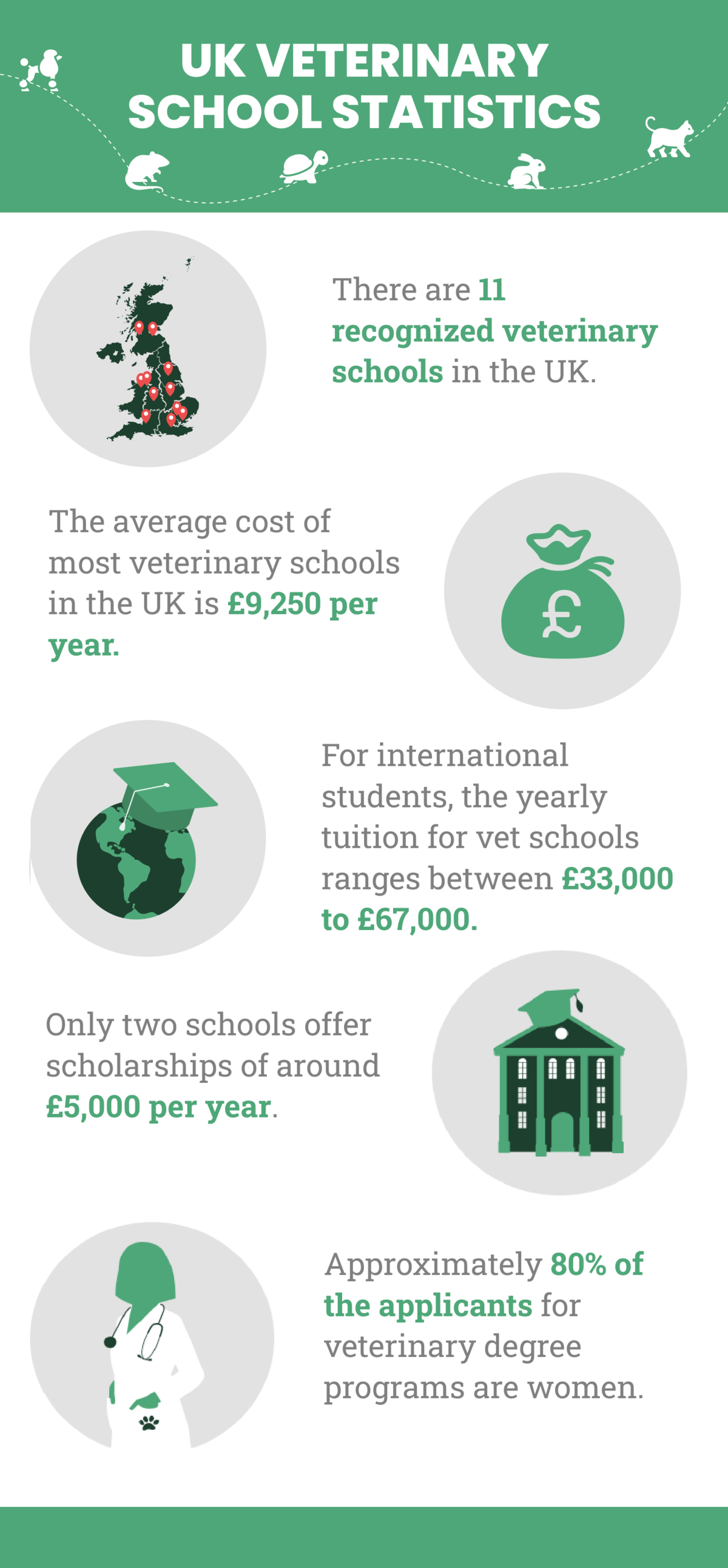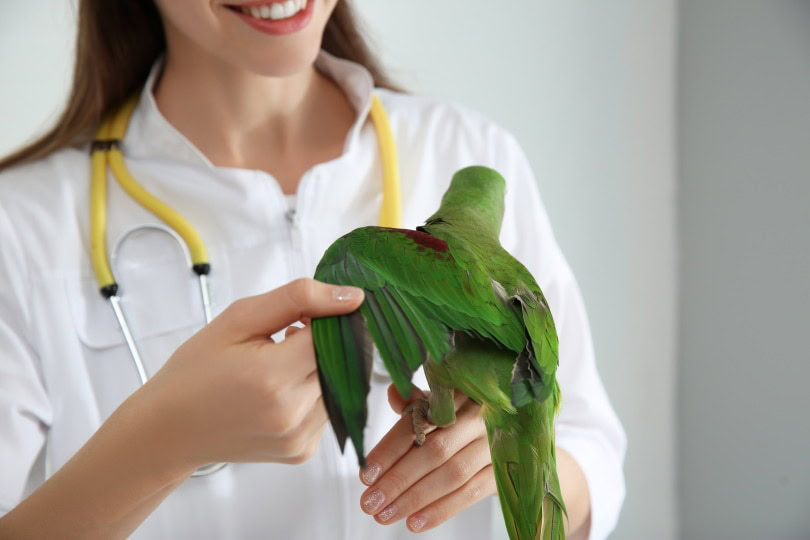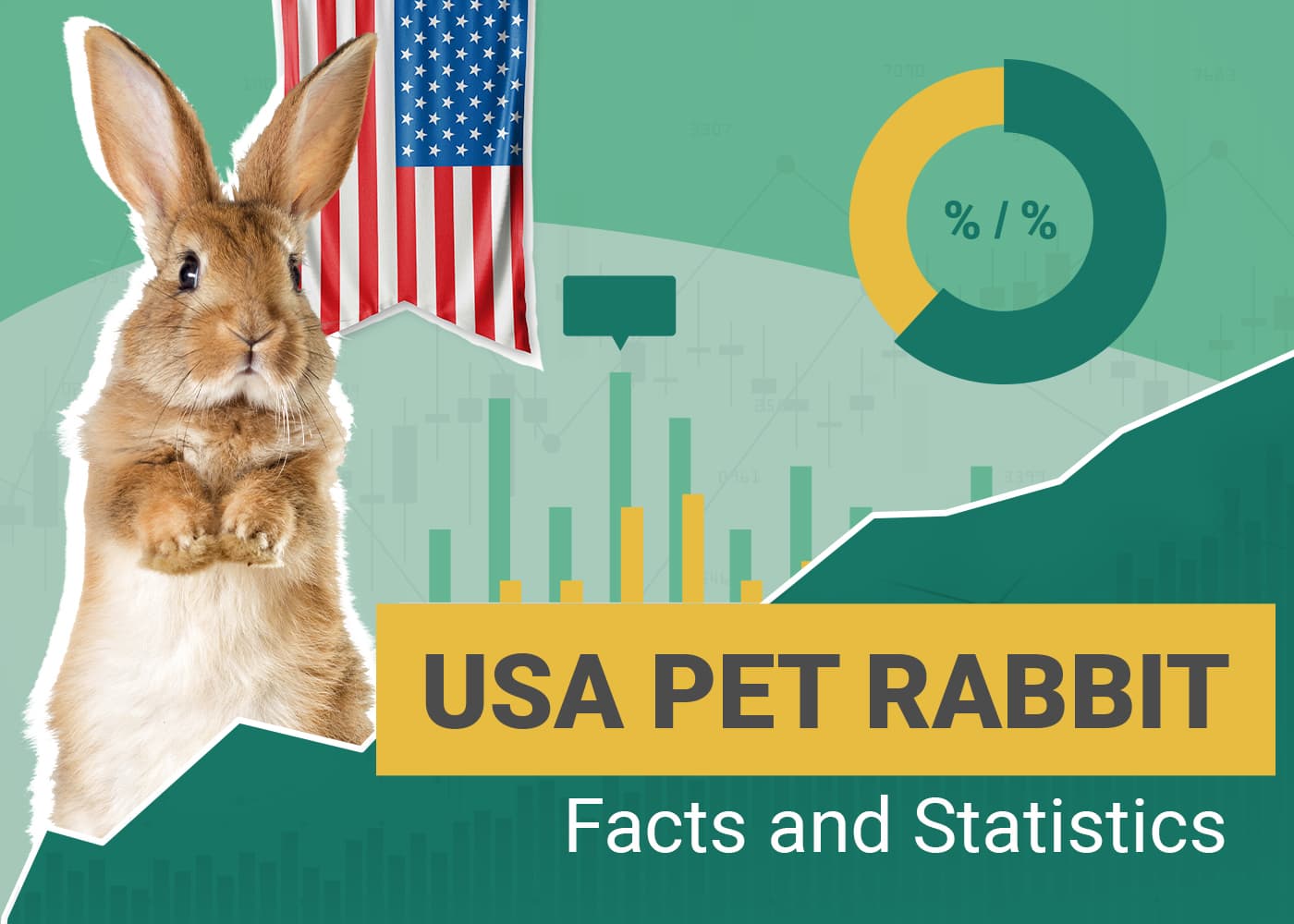Click to Skip Ahead
Note: This article’s statistics come from third-party sources and do not represent the opinions of this website.
You want to go to vet school, and you’ve decided that the United Kingdom is your destination of choice. But, how do you decide whether attending vet school in the UK is a financially viable option for you? How much does it cost to attend veterinary school in the UK?
The annual cost of studying veterinary medicine at a university in the UK can be as much as £32,000. The cost can be broken down into five major areas. They’re tuition fees, accommodation and living expenses, and books and equipment.
The average cost of studying veterinary medicine can be influenced by several factors. They include course duration, location, and university reputation.
In this guide, we’ll share facts and statistics about attending veterinary school in the UK.

Top 10 Statistics of Vet School Costs in the UK
- There are 11 recognized veterinary schools in the UK.
- The average cost of most veterinary schools in the UK is £9,250 per year.
- Scottish citizens attending vet schools in Scotland only pay £1,820 per year.
- For international students, the yearly tuition for vet schools ranges between £33,000 to £67,000.
- Mandatory EMS (Extramural Studies) will be £50 to £200 per week.
- Schools often require students to buy medical kits at £150 to £200.
- Only two schools offer scholarships of around £5,000 per year.
- Student housing can cost anywhere from £6,500 to £8,000 annually.
- Approximately 80% of the applicants for veterinary degree programs are women.
- Roughly about 50% get accepted into veterinary schools.

What is The Cost of Attending a Vet School in the UK?
1. There are 11 recognized veterinary schools in the UK.
(BVA)
If you are interested in studying veterinary medicine in the UK, there are 11 schools to choose from. Doing research on each school will help you find the one that will be a good fit for you and your future professional goals.

2. The average cost of most veterinary schools in the UK is £9,250 per year.
(The Medic Portal)
Currently, veterinary schools cost £9,250 per year. Given that it takes 5 to 6 years to earn your degree, anticipate setting aside around £50,000 for the entire tuition.
3. Scottish citizens attending vet schools in Scotland only pay £1,820 per year.
(The Medic Portal)
If you are a Scottish citizen and want to study at a Scottish school, you will only have to pay £1,820 per year in tuition, which is significantly cheaper. However, this is only for Scottish citizens who want to attend the University of Glasgow Veterinary School or The Royal (Dick) School of Veterinary Studies.

4. For international students, the yearly tuition for vet schools ranges between £33,000 to £67,000.
(The Medic Portal)
If you are not a UK citizen, attending a university to study veterinary medicine can be three to six times more expensive. It depends on the university, though. The University of Cambridge will cost you about £400,000 for the entire duration of your study. However, the University of Nottingham is around £200,000.

Additional Costs Involving UK Vet School
5. Mandatory EMS (Extramural Studies) will be £50 to £200 per week.
(University of Glasgow)
Tuition is not the only expense when enrolling in a veterinary program. Most schools require mandatory Extramural Studies (EMS) placements, which students usually fit in during holiday and summer breaks. These placements cost the student £50 to £200 per week, and a minimum of 38 are required.

6. Schools often require students to buy medical kits at £150 to £200.
(University of Glasgow)
It is important to have a medical kit to complete labs safely. However, the university usually requires the students to purchase their own. On average, a medical kit costs £150 to £200; while some of the items can be kept for a while, like nitrile gloves and practice suture pads, others will need to be replaced.
7. Only two schools offer scholarships of around £5,000 per year.
(Studyin-UK)
Currently, only two schools offer scholarships for students in the veterinary program. The Royal (Dick) School of Veterinary Studies offers a scholarship of £5,000 per year to a UK citizen or international student. The Royal Veterinary College, University of London has a full fee waiver Merit scholarship for international students.

8. Student housing can cost anywhere from £6,500 to £8,000 yearly.
(MoneySuperMarket)
Another cost to consider is the living situation. Many students opt for university-owned housing, which is a little bit cheaper at £6,500 per year. However, some students look for privately owned housing, which can be more expensive. The changing economy will also impact the rental costs, as well.
UK Vet School Enrollment Figures
9. Approximately 80% of the applicants for veterinary degree programs are women.
(Elite Veterinary Staff)
More and more women are looking to get into the veterinary field. This is evident through recent enrollment figures. About 80% of the applicants to vet programs are women. In addition, 60% of registered veterinarians are women.

10. Roughly about 50% get accepted into veterinary schools.
(VSC Admissions)
It is hard to put an exact figure on the acceptance rate into veterinary medicine programs. However, the Veterinary Schools Council estimated that there are roughly 1,200 open positions to study veterinary medicine and 50% of the applicants were accepted.

Frequently Asked Questions about How Much it Costs to Attend Veterinary School in the UK
How long do you attend veterinary school in the UK?
In the United Kingdom, a Bachelor of Veterinary Medicine and Surgery (BVMS) degree takes a minimum of five years to complete. But most students take a six-year course. It’s possible to study for a four-year degree, but you need to have a good A-level in chemistry and biology.
You also need at least three years of animal-handling experience. New entrants to the course are expected to be aged between 18 and 30. But, a mature student with a degree can apply to study for a veterinary degree.
To gain access to higher education, you’ll need at least three A-levels or equivalent qualifications.
(JYI)
Is the veterinary cost inclusive of tuition and other expenses?
Yes, the cost of a vet school is inclusive of tuition fees and other expenses. It means that when you receive your bill, it will include all costs for your program.
The only extra expense that you will have is personal living costs, such as food and housing. These can vary depending on where you choose to live while attending vet school.
Also, a few schools in the UK offer a scholarship that covers your tuition fees. But, most of the schools do not offer any scholarships.

Is attending a vet school in the UK worth it?
Many people who are thinking about going to a vet school ask whether it’s worth it. Yes, it’s worth it. To become a licensed veterinarian in the UK, students must complete a minimum of five years of undergraduate training.
Students may pursue an undergraduate program. You can go to an accredited university or via an institution that operates on a college campus. Many British veterinary schools are located at colleges affiliated with universities.
Then, you’ll be eligible to work as a qualified professional. But, if you have not attended a vet school, your chances of getting a job are slimmer.
If you have the chance to go to one of these schools, take it because it will be worth it.
(The Student Room)
What GCSE do you need to be a vet in the UK?
There are many different types of qualifications you can gain to be a vet in the United Kingdom.
Before you can even think about training to be a vet, you need to make sure that the subject you choose will lead you in that direction.
To become a vet, you will need to achieve at least an A grade in a GCSE Science subject. It must be a double science (Biology and Chemistry). The grades needed for the rest of the subjects vary depending on which college you attend. But at least a B grade is required for Math and English Language.
Is vet school harder than med school in the UK?
Yes, it’s more challenging than a medical school.
It’s uncommon for veterinary students to do many extra-curricular activities during their time in vet school. Contrary to most human medical schools, many aspiring veterinarians are hardworking.
Additionally, veterinary medicine has become challenging since its inception. This is due to rapid progress in science and technology, which allows vets to achieve better results for pets with less effort from their owners.
This way, it’s harder for new graduates to compete with experienced vets when obtaining clients who have no idea what they’re looking for in a vet.
(The Student Room)

Is it Possible to Become a Vet in Two Years?
Yes, it’s possible to become a veterinarian in two years. But you must be realistic about your expectations. You’ll not graduate on time if you cannot dedicate yourself fully to the program.
If you are in good academic standing and have made it through the pre-vet requirements, it will be possible to graduate sooner. It also means taking summer courses.
It depends on how prepared you are when coming into vet school. If you have already finished all the required pre-vet classes, then there is no reason that you cannot complete your studies in two years.
Why is Vet School Fees Expensive?
Vet school is expensive. It can be worth it, depending on your career goals and income potential. But, no matter what, it’s going to be an investment that requires a large sum of money upfront.
There are many reasons why vet school fees in the UK are so expensive. One is because of the quality of education students receive while studying to become a vet in the UK.
Another reason is that vets play a crucial role in our society. There’s a limited supply of vets compared to other professions, such as doctors and nurses.
Another reason for these high costs is due to limited availability. Many universities offer vet courses through distance learning. Here, students do not get face-to-face teaching from teachers like they would if they were attending a university locally.
(TIME FOR PAWS)

Benefits of Attending Veterinary School in the UK
If you’re considering attending veterinary school in the UK, several advantages will be available to you. First, there’s no age limit to becoming a vet.
If you attend veterinary school in the UK, there are a lot of opportunities for work after you finish your studies. The first place you can work as a vet is at a small animal practice.
Also, you can go into research and academia after graduation. Good places to find these jobs include job sites such as Indeed and Simply Hired.

Conclusion
Are you thinking about studying veterinary medicine abroad? Or are you a UK citizen interested in pursuing veterinary medicine as a possible career choice? If yes, the statistics and data above present you with all the current information about the cost to help you make prior preparations.
The veterinary school fees aren’t cheap. Planning your finances well ahead of time is crucial. The animal healthcare industry is rewarding but expensive. It makes these courses the most promising career option for many students.
However, some veterinary schools offer bursaries and scholarships for underprivileged applicants. If you’re committed to becoming a vet, make sure you contact vet schools via email or phone. This way, you’ll find out how much they charge and about funding opportunities.
Featured Image Credit: H_Ko, Shutterstock










